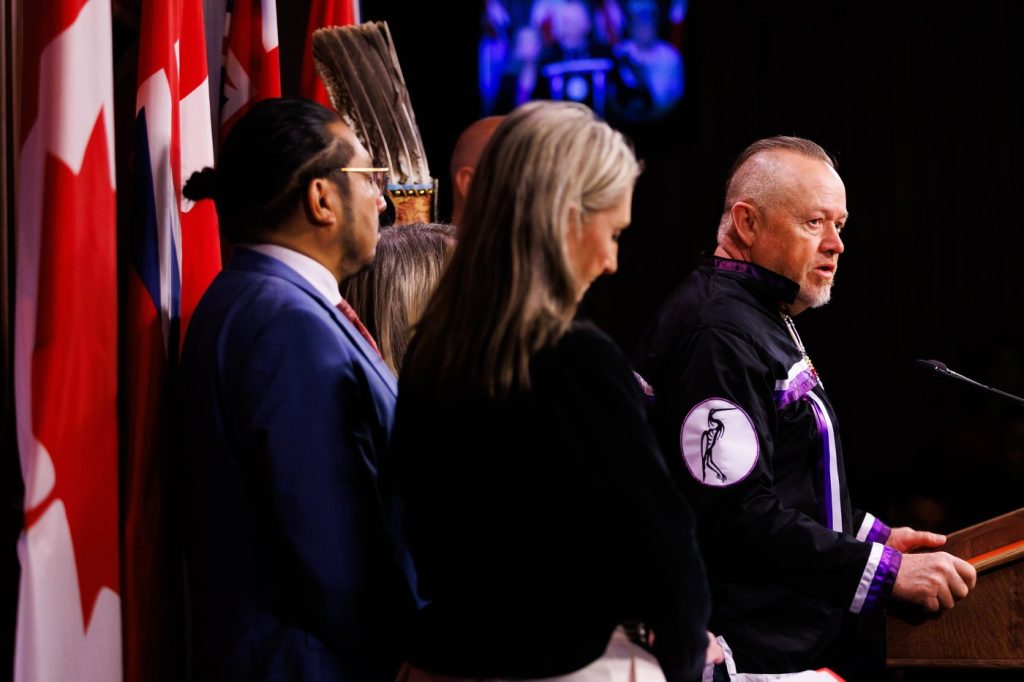OTTAWA — A regional chief for the Anishinabek Nation, Scott McLeod, recently briefed the Ontario Provincial Police (OPP) on First Nations’ planned protests against provincial and federal legislation designed to expedite major development projects. At the OPP's Orillia headquarters, McLeod explained the deep-rooted opposition from First Nations regarding these laws, asserting that they violate treaties with the Crown.
According to McLeod, the territories in question are not simply plots of land ready for resource extraction. He emphasized that these lands serve as educational institutions, grocery stores, and pharmacies for Indigenous communities. “First Nations leaders in Ontario have consistently said that we are not against development, but the development has to occur in the spirit and intent of the treaty,” he stated, indicating that genuine consultation should take place rather than merely negotiating impact benefit agreements with mining companies.
The push for fast-tracking legislation arises from shifting trade relationships with the U.S., particularly under the administration of former President Donald Trump. Recently, both the Ontario and federal governments have proposed such fast-track laws. Notably, Ontario's Bill 5, which was passed by the provincial legislature, seeks to establish “special economic zones” where the province could suspend local and municipal regulations. The Ring of Fire in northern Ontario is anticipated to be the first area designated as such, despite significant opposition from First Nations communities.
On the federal side, the legislation includes two parts aimed at dismantling trade barriers and fast-tracking major projects that align with national interests. First Nations leaders are concerned that these developments infringe upon their rights, prompting protests outside Queen’s Park in Toronto and warnings of potential legal action against Ottawa for failing to consult them adequately.
McLeod highlighted the possibility of shutting down Ontario's economy to protest the legislation, warning that if the police aim to prevent another tragic incident like the shooting of Dudley George during the Ipperwash crisis in 1995, they must understand First Nations' positions. He articulated that First Nations are adhering to their own laws by opposing the legislation, while the governments are violating treaty obligations.
The similarities in the legislation from both provincial and federal levels were not deemed coincidental by McLeod. He voiced concerns about the lack of honour in the Crown's legislative processes, predicting a resurgence of national protests akin to the Idle No More movement that emerged in 2012 against Bill C-45, which many Indigenous leaders argued threatened their rights and the integrity of environmental assessments.
During his briefing, McLeod perceived a lack of understanding from OPP officers regarding the treaty relationship and the implications of the current legislation. “The entire foundation of Canada was built on treaties. If you disregard those treaties, you’re disregarding Canada itself,” he emphasized.
As grassroots movements gain momentum, McLeod highlighted a shift in leadership dynamics, with chiefs failing to be effective diplomats, leaving operations to community members prepared to resist development in their territories. The grassroots are poised to take action, potentially impacting highways, railways, and other infrastructure in what they deem their territories.
This situation remains fluid, with no immediate response from the Ontario Provincial Police following McLeod's briefing. The sentiment in First Nations communities is clear: they are prepared for heightened activism if their concerns continue to be ignored.












